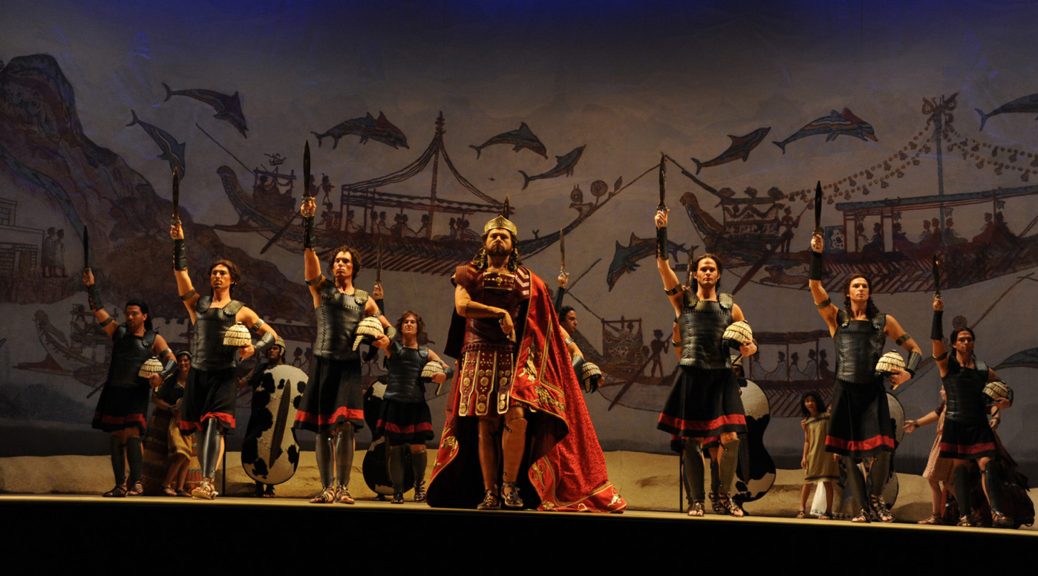
Mozart Opera Lives Again
Currently streaming free over the web, Mozart’s early opera “Idomeneo” is a flawed masterwork wrapped in a rare treat. It fairly glows with the composer’s mature musical style in arias, ensembles and scenas, but it lacks the conciseness and sparkling libretto characteristic of his later stage pieces.
For the next few weeks at any time, you can catch a very presentable, elegant and at times compelling version over the web. This was the 2011 production by Opera San Jose recalling some golden years in the South Bay. In addition to mature tenor Christopher Bengochea in the title role, it featured that late Mozart master George Cleve conducting, and fond reminiscences through dancers of Ballet San Jose, a troupe which expired four years ago.
Isn’t this a very sensible direction to head into, given the crushing financial burdens of our greatest opera companies today? This production—though hardly the most economical show among OSJ’s new-century programs, boosted by a seven-figure grant— epitomizes the direction that opera in America might be forced to take for survival: smaller theaters of intimacy (just 1,122 seats here), with rising animated singers of quality, and moderate budgets that won’t run either the troupe or the ticket-buyer into bankruptcy. You build a functional stage set without having to reconstruct the pyramids of Egypt.
For an ensemble whose stage is shut down now by the virus, the streaming of opera makes a lot of sense. And this “Idomeneo” wears well, starting with one of the most stormy-dramatic overtures this side of “Don Giovanni.” But “Idomeneo” staged would wear much better if judicious shears were applied for focus and conciseness. It’s burdened by too many stifling blankets of the static old baroque opera-seria format to enkindle every modern audience. The ceremonious finale with chorus and ballet is particularly drawn out.
It’s a tale tied very loosely to characters of Homer’s “Iliad.” Idamante and the heroine soprano Illia, survivors of dogged warring factions, fall in love, bucking the odds. Complicating things further, Idamante’s father King Idomeneo survives a shipwreck storm and vows to sacrifice his own son, Abraham-Isaac style, to appease the Greek gods. Yet more complexity stems from the villainous Elettra (yes, good old Electra) yearning to beat out Illia for Idamante’s attentions.
The opera springs to life with a vocal trio halfway through, in the sort of fetching ensemble we never get in baroque operas. The act ends with a rousing chorus-finale and one of Mozart’s finest storm scenes. The last act offers a fine-tuned love duet for Idamante and Illia, then a quartet-ensemble highlight, along with Elettra’s scenery-chewing frustration aria writhing about the stage like a wounded crocodile. Meanwhile the king has it easy—traditionally, opera’s royalty have the cloak and crown do most of the acting for them.
Vocally, this casting is above average, with the unflappable Bengochoa as Idomeneo, a real presence at center stage, the pearl among the four tenors called for in the cast. The heroine Illia was played by Rebecca Davis, notable for her Mozartian lyricism—superbly contrasted against the malevolent Elettra (Christina Major), whose villainy actually elicited chuckles of delight from the San Jose audience.
Kudos to Opera San Jose for making this free streaming available during the current anti-virus shutdown period.
The challenges of animating this s-l-o-w baroque-style libretto was addressed nicely by Stage Director Brad Dalton. Above all in spirit and lyricism was the San Jose legend, conductor George Cleve (1936-2015), whose gift for Mozart may have begun with a brilliant choice of birthplace—Vienna. Cleve navigated a demanding and compelling score through a three-hour-plus arc; this work provides a memorable legacy.
END OF AN ERA—Cleve was the last of the notable trio of Eastern-European conductors dominating Northern California music starting in mid-20th century, via his Midsummer Mozart and the San Jose Symphony: That other Viennese, Kurt Herbert Adler, directing the San Francisco Opera over three decades, and the Hungarian émigré and Stanford Professor Sandor Salgo, who led the Carmel Bach Festival for a similar period.
MOZART’S OPERA “Idomeneo” in Italian with subtitles, from 2011 at the California Theater, San Jose, CA streaming free of charge 24/7 through May 18 online via www.operasj.org . Length 200 minutes, three acts.